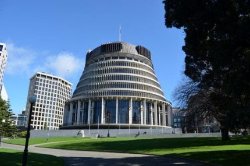Gordon Campbell on Corbyn, Trump and outsider politics
Gordon Campbell on Corbyn, Trump and outsider politics
Jeremy Corbyn elevated to the leadership of Britain’s Labour Party! Donald Trump and Bernie Sanders on the rise in the US… On both sides of the Atlantic, these are dark days for the political Establishment. Career-wise, it must be hard to have spent years buttering up the mandarins of New Labour, only to see some pariah like Corbyn come in and take over the ship, all in a matter of months. Over the same period, we’ve seen the evolution of Donald Trump from the joke candidate mocked by the party Establishment and the mainstream media… to the point where he now looks like the re-incarnation of Ronald Reagan. Who knew that the Donald would turn out to be the second coming of the Ronald?
It all seems so inevitable now, with the blessed benefit of 20/20 hindsight. In the world beyond New Zealand, the public feels disfranchised by a political club – and economic growth – that seems to do them no personal good whatsoever. And they’re not willing to take it any longer. Really, it should be no surprise that a piece of political ectoplasm like Donald Trump should finally come along and assume whatever shape and position that’s likely to offend the party apparatchiks and the media elite the most.
Thus far, 2015 has been the year of the political outsider. Trump, Sanders and now Corbyn. In the early contests in Iowa and New Hampshire, Bernie Sanders is polling as a serious threat to what only a few months ago had looked like an inexorable march by Hillary Clinton to the Democratic Party’s presidential nomination. Joe Biden and even Al Gore are being pulled out of the cupboard by a nervous party machine, to see if they’re still in running order.
Of course, Europe has been engaging in outsider politics – Syriza in Greece, Podemos in Spain - for quite some time, but Europe’s foibles can usually be ignored by the wider world. That smashing first ballot victory by Corbyn is less easy to
dismiss - although RNZ did do its best to draw up its skirts and reach for the smelling salts. Over the weekend, RNZ news bulletins described Corbyn as “an admirer of Karl Marx” as “an extreme left winger” and as someone whose agenda includes “increasing government investment though money-printing and re-nationalising parts of the economy”. A screwball, in other words. To date, the media verdict on Corbyn – here and in England - has been strikingly similar to that of his political opponents, whose views are treated with a whole lot more reverence. Funny that.
To state the bleedingly obvious, it’s another sign of how public opinion differs quite sharply from the norm as defined by the two major parties. Pollsters in Britain have known this for some time.
According to the poll, voters support state-imposed price controls on the utilities, re-nationalisation of the railways and Royal Mail, an end to private cash in the public sector and even state power to regulate rents.
Likewise, the polls in New Zealand have consistently shown that the public strongly oppose asset sales, and in 2013, they said so in a referendum. Fat difference it made. Ditto on wanting more government spending in New Zealand on public transport.
On refugees, the public’s views are more mixed – but even so, a wide swathe of public opinion clearly wants our government to respond more generously (and faster) than it has done to date. Consistently, a Key-led government has been more popular than the policies it enacts.
Those same disjuncts exist in Britain. To the consternation of the RNZ newsroom, Corbyn’s pledge about “re-nationalising the rail system” actually enjoys massive public support – 70% in a 2012 poll, 60% in the run-up to the British election. Moreover, that screwball policy of “increasing government investment through money-printing” is commonly called “quantitative easing” - and it has been a key feature of the US Federal Reserve’s response to the Global Financial Crisis, and was central to the US economic recovery. Screwballs, all of them. Obviously.
Alas, Corbyn’s rise – and the virulent reaction to it – does reflect a climate where only a narrow range of policy options is deemed credible, and all the alternatives get demonised. Despite all its talk about freedom, neo-liberalism is inflexible in practice. Business as usual is treated as being the only sensible and desirable option, even though those settings seem impotent - or worse – when it comes to tackling climate change, income inequality, job insecurity, the looming economic downturn and the plight of the world’s 30 million refugees. This track record of failure explains why the public feels only lukewarm ( at best) about the consensus that still prevails in, and around, Parliament.
Corbyn’s task is to de-programme the British public. Luckily, the anxiety about any deviation from the norm seems ripe for dispersal. If Corbyn can survive the rolling attacks from the media – always more alert to the threats posed by the “loony left” than those from the rabid right – he will be a useful test of public opinion. Already, his leadership seems likely to reverse some of British Labour’s recent losses in Scotland, and for similar reasons he will reclaim some of the losses made by Labour to UKIP. Meaning: the wider task may not be as hard as it looks on paper. In the recent British election for instance, was Ed Milliband punished by the voters for being too left wing – which is the conventional wisdom – or did Labour’s traditional supporters punish him for not being left wing enough? This is an interesting analysis:
…the perceived scale of the defeat was exaggerated by the false opinion polls and Labour’s collapse in Scotland. The party gained over a million extra votes in England. Overall, it gained only 200,000 fewer votes than in 2005, when it won an overall majority. Having lost nearly 4 million Labour votes under the supposedly infallible Tony Blair, 2015 was the first election since 1997 in which Labour increased its vote….
Moreover:
Did [British] Labour perform disappointingly because its manifesto was perceived as too left-wing, the lesson of 1983? Clearly, it didn’t gain enough Conservative votes in England. But unlike in 1983 – shortly after the party had split to its right – it also lost shedloads of votes to parties positioned to its left. The SNP, Plaid Cymru and the Greens together tripled their 2010 vote, to nearly 3m. Indeed, if you add the votes for those anti-austerity parties to Labour’s, you beat the Conservatives by more than 800,000.
Here again, we see the pull of outsider politics, with voters breaking further to the left, and further to the right. Unlike in 1983, 6.6 million people voted in 2015 for parties opposed to the Westminster status quo:
[This ]begs the question of the nearly 4m-strong vote, particularly in the 44 seats in which it came second to Labour (and the 2.4m votes for the Liberal Democrats). There was not a progressive majority in the 2015 general election. But there was a spectacular progressive swing in parts of the kingdom that ate into Labour’s vote. In addition, in many Labour places an angry, oppositional party took votes away from Labour, but also from its traditional opponents (where Ukip came second, knocking Conservatives and/or Liberal Democrats into third).
Arguably, it is UKIP, and not Jeremy Corbyn that is the British equivalent of Donald Trump…. and it was only the bizarrely unfair nature of the British first-past-the-post electoral system that prevented UKIP’s support from being fairly represented at Westminster. To repeat: Corbyn stands a real chance of winning back support in Scotland and of reversing UKIP’s erosion of Labour’s old strongholds in the north of the country.
As yet, the ‘outsider’ response reflected in the rise of Corbyn/Trump/Sanders hasn’t registered to any extent in New Zealand. On RNZ this morning, the poll-of-polls in August show that National is once again comfortably ahead of the Labour/Green combined vote. Could that be partly because the new faces at the helm of the left – Andrew Little and James Shaw – seem to be heading away from the margins? Both Labour and the Greens are converging on the centre, and appear intent on gaining credibility - on the economy in particular – as a safe pair of hands. Right now, a sizeable chunk of public opinion is going unheard, and unrepresented.
Dispelling The Beigeness
Last year, British poet Kate Tempest did a good job of putting some of her knottier lines to music. “The Beigeness” deals with the fear of wearing your true colours out in public:
In the valley of
vanity viciousness
full schedules and empty
containers
we're kissing the coshes that cripple
us
enjoying the beigeness
Do it your way and I'll find
you ridiculous
pick apart a partner’s
behaviour
their scorn ignites what inhibits us
and
then we hate ourselves
and our fear pickles
us….
Some of us are happy to live with it.
But some of us know it’s against our nature...
The sound in her live set from Glastonbury in June 2015 is a bit thinner than on the album, but she still rocks the stage….


 Binoy Kampmark: The Australian Defence Formula, Spend! Spend! Spend!
Binoy Kampmark: The Australian Defence Formula, Spend! Spend! Spend! Ian Powell: New Hospital Building Trumps ‘Yes Minister’ Hospital Without Patients
Ian Powell: New Hospital Building Trumps ‘Yes Minister’ Hospital Without Patients Mike Treen: Prices Are Still Rising - It's A Cost Of Living Crisis
Mike Treen: Prices Are Still Rising - It's A Cost Of Living Crisis Gordon Campbell: On When Racism Comes Disguised As Anti-racism
Gordon Campbell: On When Racism Comes Disguised As Anti-racism Peter Dunne: Newshub And TVNZ Tip Of Media Iceberg
Peter Dunne: Newshub And TVNZ Tip Of Media Iceberg Harry Finch: Austerity – For And Against
Harry Finch: Austerity – For And Against